What Happens If You Neglect Your Pool For A Few Weeks?
If you leave your pool unattended for even a few weeks, you can expect cloudy water, algae growth, equipment strain, and a lot more work to get things back under control. While fibreglass pools are lower maintenance, they still need regular care to stay clean and safe. Here’s what really happens when your pool is left on its own and what you should do to prevent bigger issues.
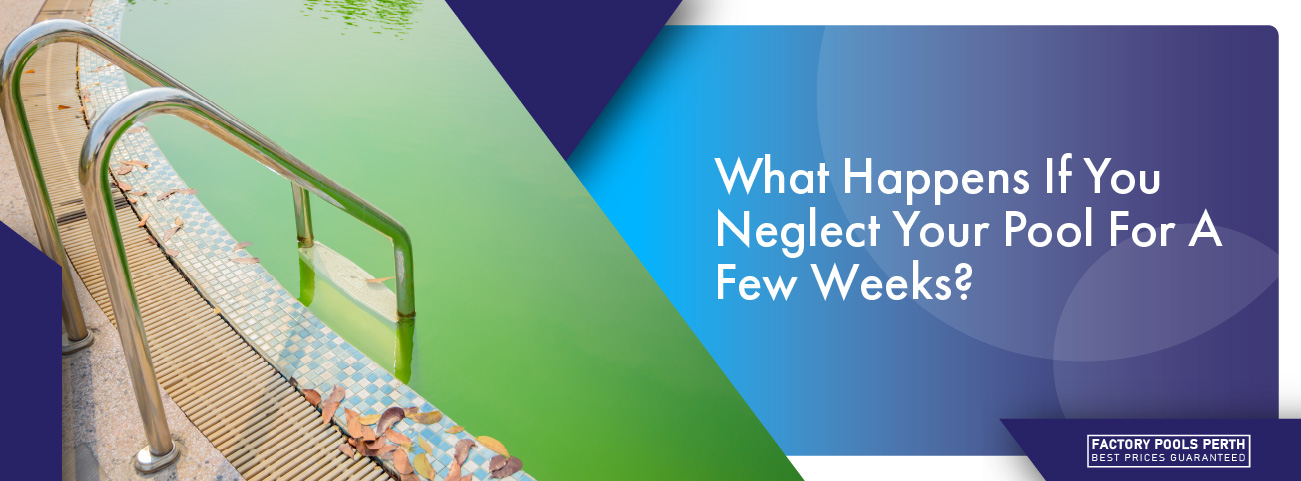
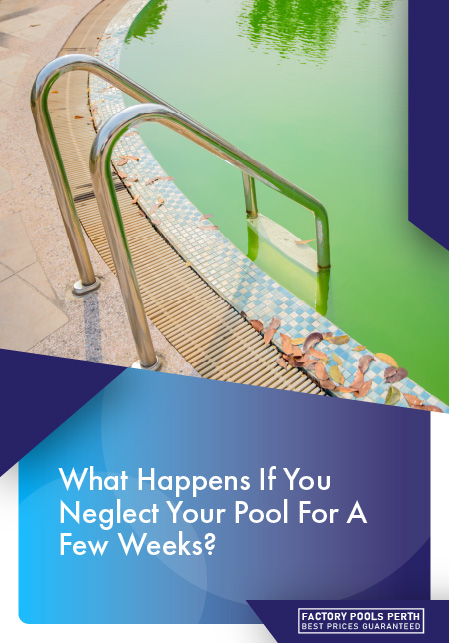
The Impact Of Leaving Your Pool Unattended
Pools don’t take long to show signs of neglect. When water isn’t circulating properly and chemicals aren’t being maintained, small imbalances can snowball into major problems. Algae blooms, bacteria build-up, unpleasant smells, and damage to your pool’s surfaces and equipment can all result. Regular upkeep doesn’t just keep your water sparkling—it also protects your investment and saves you from expensive fixes down the line.
Even a pool that looks fine on the surface can have hidden problems starting to form underneath. Water that feels slimy or has a strong chlorine smell is often the first sign something is wrong. By catching these warning signals early, you can save yourself from a time-consuming clean-up later.
Cloudy And Unbalanced Water
The first thing you’ll notice when you neglect your pool is a change in water clarity. Without testing and treating, pH and chlorine levels quickly drift out of balance. Once this happens, water can turn cloudy and uninviting. Not only does it look unappealing, but it also signals that your pool isn’t safe to swim in.
Cloudiness can be caused by anything from heavy rain to sunscreen residue. If you’ve left your pool unattended, all those little influences add up quickly. Balanced water chemistry is your first defence against these issues, and it’s much easier to maintain than restore after things get out of hand.
What You Can Do
- Test water as soon as possible – Use a reliable kit to check pH, chlorine, and alkalinity.
- Shock treat if necessary – A chlorine boost can help restore safe levels.
- Run the pump longer – Good circulation helps chemicals work effectively.
- Remove debris quickly – Leaves, bugs, and organic matter add to water imbalance.
- Re-test daily – Stay on top of levels until the pool clears.
Algae Blooms And Green Pool Water
It doesn’t take long for algae to take over if chlorine drops too low. A pool that was crystal clear can turn green in a week or two, especially in warmer weather. Algae not only looks unpleasant but also makes surfaces slippery and unsafe. If it spreads too far, it can take days or even weeks to restore balance.
You might also notice mustard or black algae, which are more stubborn to remove. These forms attach more firmly to surfaces and can resist normal treatments. That’s why staying consistent with chlorine and brushing down the pool is so important—it prevents tough strains from getting a foothold.
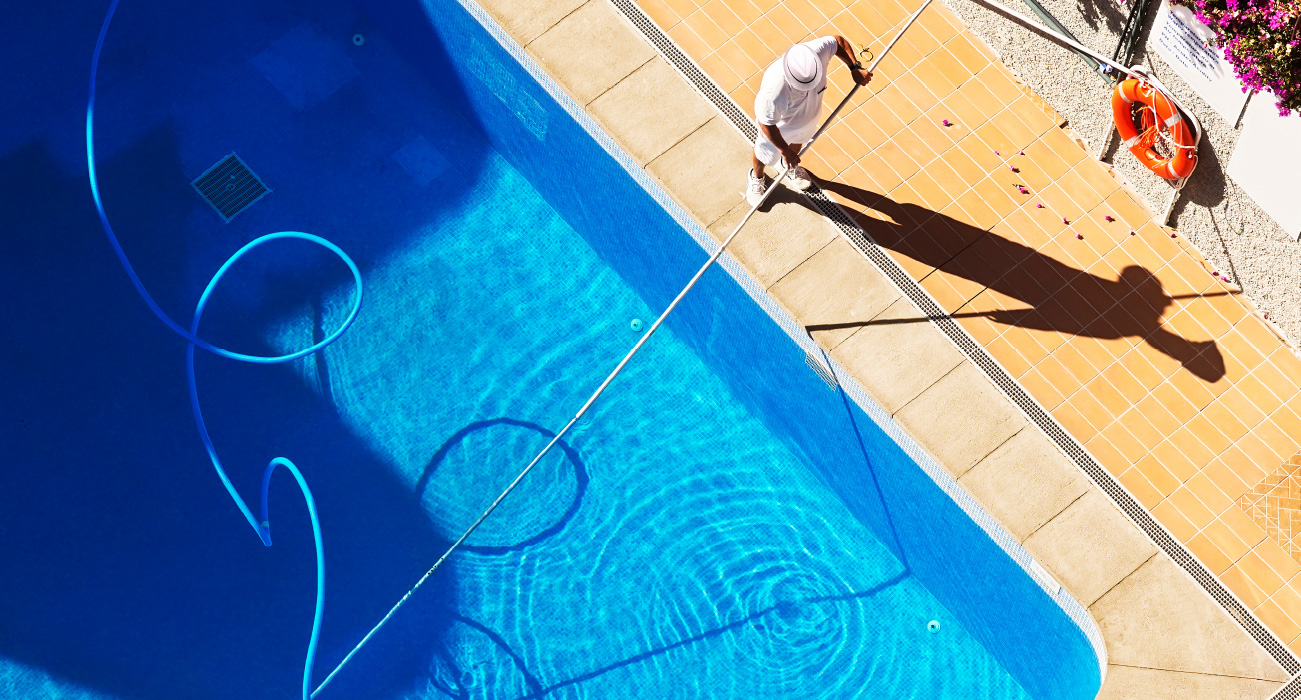
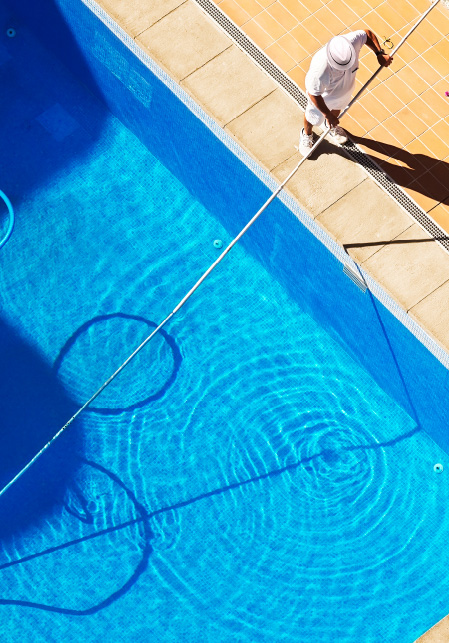
How To Respond
- Brush walls and steps – Break up algae clinging to the surface.
- Shock the pool – Use a heavy dose of chlorine to kill growth.
- Keep the filter running – Continuous circulation helps remove spores.
- Vacuum debris – Get rid of dead algae before it clogs the system.
- Check stabiliser levels – High cyanuric acid can make chlorine less effective.
Stains And Surface Issues
Even though fibreglass pools are built to resist staining, neglect can still leave marks behind. Leaves, dirt, and metals in the water can leave discolouration on the surface. The longer stains sit, the harder they are to remove. Catching them early is always easier than trying to clean them after weeks of build-up.
Neglected water can also make your pool feel rough instead of smooth. Chemical imbalances encourage calcium to build up along the waterline, leaving unsightly scale. This not only looks bad but also takes more effort to clean once it hardens.
Preventing And Managing Stains
- Skim regularly – Removing leaves before they sink prevents organic stains.
- Vacuum weekly – Keeps dirt and debris from settling on the floor.
- Brush problem areas – Focus on steps and corners where debris gathers.
- Keep water balanced – Proper chemistry reduces the risk of mineral stains.
- Act fast – Treat stains quickly before they set into the surface.
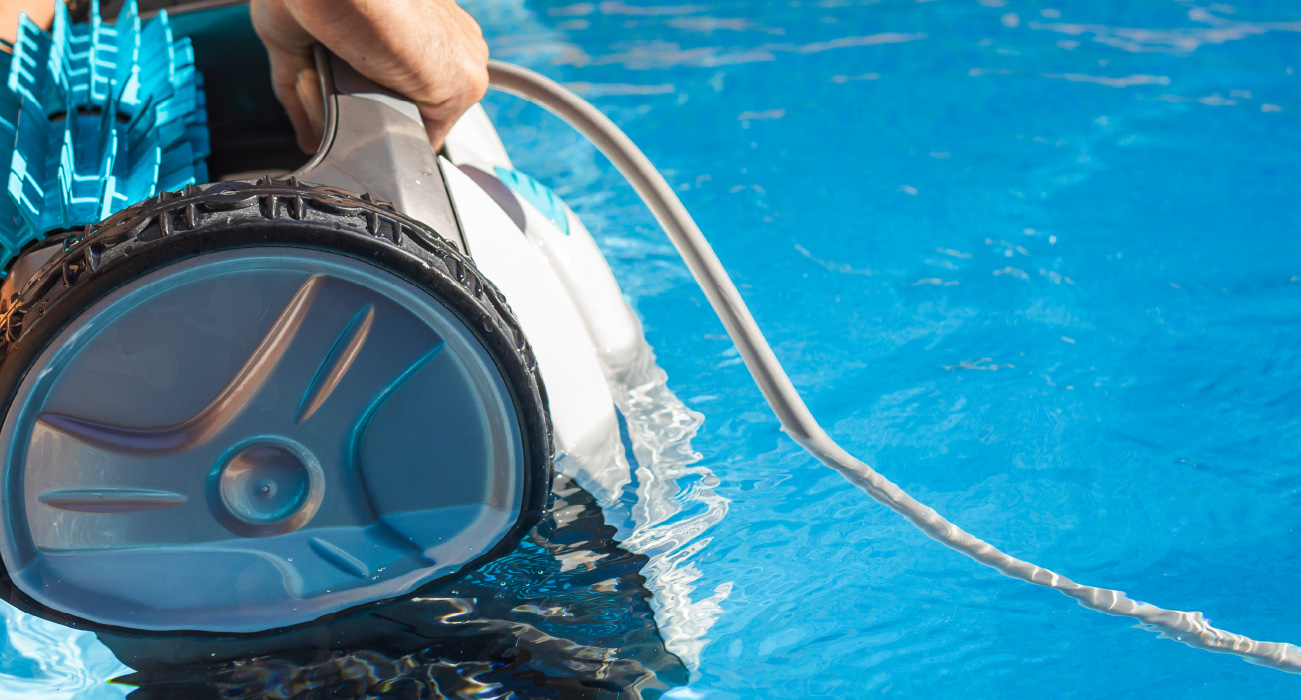
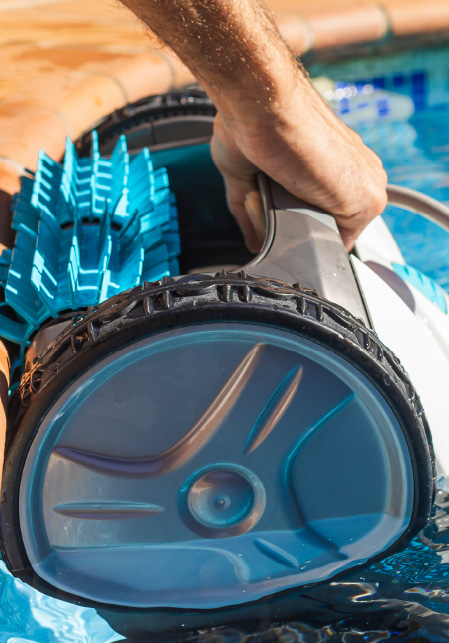
Equipment Strain And Blockages
Your pump, filter, and chlorinator are designed to keep your pool water moving and healthy. When the pool isn’t maintained, these systems end up working harder against debris, algae, and cloudy water. Over time, this adds strain and can reduce the life of your equipment. Regular checks and cleaning are essential to avoid breakdowns.
Neglecting equipment can also cause chain reactions. A blocked skimmer basket leads to weak circulation, which then makes algae worse. A clogged filter reduces efficiency, causing your pump to overwork. All of this adds up to higher energy bills and more risk of costly servicing.
Protecting Your Equipment
- Empty the skimmer basket – Prevent blockages that restrict water flow.
- Clean the pump basket – Leaves and dirt can quickly clog circulation.
- Monitor filter pressure – Rising pressure signals it’s time to backwash or rinse.
- Inspect for noises – Grinding or rattling can mean parts are under stress.
- Book seasonal servicing – Professional maintenance keeps everything running smoothly.
Higher Costs And More Work Later
One of the biggest downsides of neglect is the time and money it takes to fix problems later. What could have been solved with a quick skim and test kit can become a lengthy clean-up involving multiple treatments, professional help, and wasted water. Staying on top of your pool saves you from the frustration of trying to recover a badly neglected system.
Neglect doesn’t just affect appearance—it affects enjoyment. The more your pool is left, the longer it takes before you can comfortably swim in it again. A bit of attention each week makes sure your pool is always ready for family and friends, without any waiting or disappointment.
Why Prevention Matters
- Chemicals cost less than recovery – Routine doses are cheaper than multiple shock treatments.
- Equipment lasts longer – Clean, balanced water reduces strain on pumps and filters.
- Surfaces stay in better shape – Neglected water can damage finishes over time.
- Health risks are reduced – Balanced water prevents harmful bacteria from growing.
- Your pool is always ready – A well-kept pool means no long waits before you can swim again.
When You Need Professional Help
Even with regular care, sometimes your pool may need professional attention. If water doesn’t clear up after multiple treatments, if algae keeps returning, or if equipment starts to fail, it’s time to bring in a pool technician. At Factory Pools Perth, we’re proud to supply pools designed for easier maintenance, but every pool owner benefits from expert servicing now and then. Knowing when to step back and call for help saves you time and protects your investment.
Leaving your pool unattended for a few weeks can cause cloudy water, algae, staining, and equipment strain. The longer you leave it, the harder it becomes to get things back on track. With consistent care, you’ll avoid expensive fixes and enjoy a pool that’s always ready for a swim. Don’t let neglect undo your investment—contact Factory Pools Perth today and make sure your pool stays in top condition.

